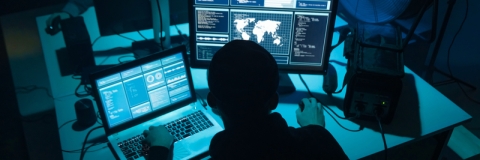

Explore our research in cybercrime and cybersecurity
We're researching how crime takes place using technology, and studying the impact such crimes have on society and individuals.
The Cybercrime and Cybersecurity group in the School of Criminology and Criminal Justice brings together interdisciplinary researchers to advance knowledge and impact in the field.
Cybercrime is an umbrella term applied to criminal and harmful behaviours that are facilitated online or via the use of digital technologies, or which only occur due to the existence of such tools. Cybersecurity focuses on techniques of protecting digital technologies, networks and data against criminal or unauthorised activity.
Our research includes, but is not limited to, addressing the reasons behind online deviant and criminal activity as well social and technical approaches to preventing and tackling cybercrimes. This includes the following topics:
- online extremism
- decision-making in critical incidents
- artificial intelligence (AI)
- cyber fraud
- cyber warfare
- online child exploitation
- online gender abuse
- information security within schools
- social media
- Open Source Intelligence (OSINT)
- hacking and hacktivism
- dis/misinformation
With more people and services using digital technologies, cybercrime will continue to rise in scale and complexity. Cybercrime affects essential services, businesses, and individuals, resulting in major social and economic impact — financial as well as emotional harms, and threats to national security.
Cybercrime is a global problem impacting upon human rights, democracy and the rule of law, as well as international peace and stability. It is essential that solutions are identified to tackle the different forms of cybercrimes and online harms.
Research impact
Research in this space helps to empower individual users, organisations, and governments to mitigate, protect against, and prevent cybercrimes. It informs policy, practice and legislation, enabling authorities to investigate and respond to cybercrimes and cybercriminals, and support victims. Cybercrime is a dynamic area, including emerging topics with limited research. Work in this area is therefore at the forefront of new knowledge.
Our research has informed the National Police Chief’s Council strategy on Violence Against Women and Girls (VAWG) and national policy on misogyny. Other research is impacting upon the development of the forthcoming Online Safety Bill, as well as the review of the Computer Misuse Act and the Domestic Abuse Bill.
Researchers

Media ready expert
Dr Lisa Sugiura
PhD projects
- A sociotechnical exploration of Information Security within UK schools
- Enhancing Critical Incident Decision-Making
- A Multi-Platform Investigation of Group Membership Formation and Indoctrination of Incels Online
- Analysing and Challenging Representations of Female Jihadi Radicalisation
- A Critical Grounded Theory Based Analysis of Online Anti Child Sex Offender Activism using Internet Research Tools and an Online Ethnographic Methodology
- Conceptual and Practical Challenges of Cybersecurity: Shifting the Boundaries of Definition, Education and Expectation
- “Switch it off and turn it back on again” — looking beyond technical measures, exploring the importance of cyber security leadership, culture and governance in protecting UK Critical National Infrastructure.


